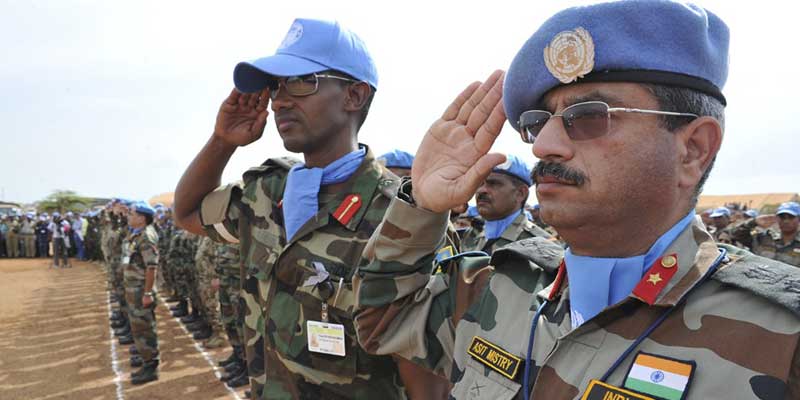- India
- Dec 21
Explainer / India and UN peacekeeping
About 850 Indian peacekeepers serving in South Sudan have been awarded the prestigious UN medal for their service and contribution to building peace in the strife-torn nation and supporting local communities.
India is among the largest troop contributing countries to UN peacekeeping operations. Currently, 2,342 Indian troops and 25 police personnel are deployed with the UN Mission in South Sudan (UNMISS).
The UNMISS said Indian peacekeepers have been “recognised for their strong contribution to building peace in conflict-affected South Sudan as well as for going above and beyond their duties to support local communities”.
What is peacekeeping?
UN peacekeeping helps countries torn by conflict create conditions for lasting peace. Peacekeeping has proven to be one of the most effective tools available to the UN to assist host countries navigate the difficult path from conflict to peace.
It is a unique global partnership. It brings together the General Assembly, the Security Council, the Secretariat, troop and police contributors and the host governments in a combined effort to maintain international peace and security.
Peacekeeping has unique strengths, including legitimacy, burden sharing, and an ability to deploy and sustain troops and police from around the globe, integrating them with civilian peacekeepers to advance multidimensional mandates.
Peacekeeping has always been highly dynamic and has evolved in the face of new challenges. Former UN secretary-general Ban Ki-moon established a 17-member high-level independent panel on UN peace operations to make a comprehensive assessment of the state of UN peace operations today, and the emerging needs of the future.
What do peacekeepers do?
UN peacekeepers (often referred to as Blue Berets or Blue Helmets because of their light blue berets or helmets) can include soldiers, police officers and civilian personnel. They provide security and the political and peacebuilding support to help countries make the difficult, early transition from conflict to peace.
Peacekeeping is flexible and over the past two decades has been deployed in many configurations. There are currently 13 UN peacekeeping operations deployed on three continents.
Today’s multidimensional peacekeeping operations are called upon not only to maintain peace and security, but also to facilitate the political process, protect civilians, assist in the disarmament, demobilisation and reintegration of former combatants. They support the organisation of elections, protect and promote human rights and assist in restoring the rule of law.
India’s role in UN peacekeeping
More than 200,000 Indians have served in 49 of the 71 peacekeeping missions established around the world since 1948.
Currently, there are around 6,700 uniformed peacekeepers from India, the vast majority of them in the Democratic Republic of Congo and South Sudan.
Commencing with its participation in the UN operation in Korea in 1950, India has a long and distinguished history of service in UN peacekeeping, having contributed more personnel than any other country, as well as the first-ever all-female force that helped to bring peace to Liberia in the wake of that country’s brutal civil war.
From 2007 to 2016, there were nine rotations of all-female police units from India, whose primary responsibilities were to provide 24-hour guard duty, public order management and conduct night patrols in and around the capital, Monrovia, while assisting to build the capacity of local security institutions.
Hailed as role models, these female officers not only played a vital role in restoring security in the West African nation but also contributed to an increase in the number of women in the country’s security sector.
Medical care is among the many services Indian peacekeepers provide to the communities in which they serve on behalf of the UN. They also perform specialised tasks such as veterinary support and engineering services.
Indian veterinarians serving with the UNMISS, for example, stepped up to help cattle herders who were losing much of their stock to malnutrition and disease in the war-torn nation.
India has also provided 15 force commanders to various missions, and was the first country to contribute to the trust fund on sexual exploitation and abuse, which was set up in 2016.
As of June 30, 2018, more than 160 Indian peacekeepers have lost their lives while serving with the UN.
India and UNMISS
South Sudan became independent on July 9, 2011. The birth of the Republic of South Sudan is the culmination of a six-year peace process which began with the signing of the Comprehensive Peace Agreement in 2005.
The Security Council determined that the situation faced by South Sudan continued to constitute a threat to international peace and security in the region and established the UNMISS to consolidate peace and security and to help establish conditions for development.
The Indian troops were praised for their efforts to support peace talks between the government and the opposition forces in the Upper Nile region and establishing the first-ever UNMISS base on the west bank of the Nile at Kodok.
The peacekeepers also supported local communities by building veterinary hospitals in Kodok and Malakal, training cattle-keepers to better care for their livestock and provided life-saving medical assistance to people in need.
Last month, a total of 323 of Indian peacekeepers serving with the UNMISS as engineers and medical staff were also honoured with UN medals for their distinguished service.
Engineering troops from India serving with the UNMISS perform a variety of duties that help the local communities. They are working on rehabilitating 167-km of road from Malakal to Palouge, later to be extended to Renk. Once the repairs are finished, the road will help facilitate peacekeeping operations, humanitarian access and trade.
Indian peacekeepers go above and beyond their call of duty to impart training and assistance to local communities in their daily lives. A team of medical staff from the Indian field hospital and a few other volunteers are also teaching how girls to ride a bike.
Manorama Yearbook app is now available on Google Play Store and iOS App Store

